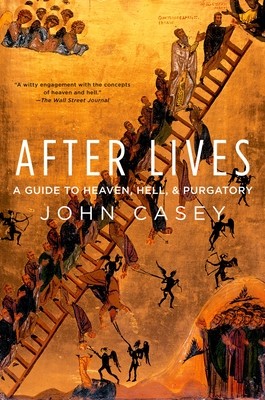
- We will send in 10–14 business days.
- Author: John Casey
- Publisher: Oxford University Press, USA
- ISBN-10: 0199975035
- ISBN-13: 9780199975037
- Format: 15.5 x 23.1 x 3.3 cm, minkšti viršeliai
- Language: English
- SAVE -10% with code: EXTRA
Reviews
Description
One of the most profound, deeply affecting questions we face as human beings is the matter of our mortality--and its connection to immortality. Ancient animist ghost cultures, Egyptian mummification, late Jewish hopes of resurrection, Christian eternal salvation, Muslim belief in hell and paradise all spring from a remarkably consistent impulse to tether a triumph over death to our conduct in life.
In After Lives, British scholar John Casey provides a rich historical and philosophical exploration of the world beyond, from the ancient Egyptians to St. Thomas Aquinas, from Martin Luther to modern Mormons. In a lively, wide-ranging discussion, he examines such topics as predestination, purgatory, Spiritualism, the Rapture, Armageddon and current Muslim apocalyptics, as well as the impact of such influences as the New Testament, St. Augustine, Dante, and the Second Vatican Council. Ideas of heaven and hell, Casey argues, illuminate how we understand the ultimate nature of sin, justice, punishment, and our moral sense itself. The concepts of eternal bliss and eternal punishment express--and test--our ideas of good and evil. For example, the ancient Egyptians saw the afterlife as flowing from ma'at, a sense of being in harmony with life, a concept that includes truth, order, justice, and the fundamental law of the universe. "It is an optimistic view of life," he writes. "It is an ethicthat connects wisdom with moral goodness." Perhaps just as revealing, Casey finds, are modern secular interpretations of heaven and hell, as he probes the place of goodness, virtue, and happiness in the age of psychology and scientific investigation. With elegant prose, a magisterial grasp of a vast literary and religious history, and moments of humor and irony, After Lives sheds new light on the question of life, death, and morality in human culture.
EXTRA 10 % discount with code: EXTRA
The promotion ends in 22d.18:41:17
The discount code is valid when purchasing from 10 €. Discounts do not stack.
- Author: John Casey
- Publisher: Oxford University Press, USA
- ISBN-10: 0199975035
- ISBN-13: 9780199975037
- Format: 15.5 x 23.1 x 3.3 cm, minkšti viršeliai
- Language: English English
One of the most profound, deeply affecting questions we face as human beings is the matter of our mortality--and its connection to immortality. Ancient animist ghost cultures, Egyptian mummification, late Jewish hopes of resurrection, Christian eternal salvation, Muslim belief in hell and paradise all spring from a remarkably consistent impulse to tether a triumph over death to our conduct in life.
In After Lives, British scholar John Casey provides a rich historical and philosophical exploration of the world beyond, from the ancient Egyptians to St. Thomas Aquinas, from Martin Luther to modern Mormons. In a lively, wide-ranging discussion, he examines such topics as predestination, purgatory, Spiritualism, the Rapture, Armageddon and current Muslim apocalyptics, as well as the impact of such influences as the New Testament, St. Augustine, Dante, and the Second Vatican Council. Ideas of heaven and hell, Casey argues, illuminate how we understand the ultimate nature of sin, justice, punishment, and our moral sense itself. The concepts of eternal bliss and eternal punishment express--and test--our ideas of good and evil. For example, the ancient Egyptians saw the afterlife as flowing from ma'at, a sense of being in harmony with life, a concept that includes truth, order, justice, and the fundamental law of the universe. "It is an optimistic view of life," he writes. "It is an ethicthat connects wisdom with moral goodness." Perhaps just as revealing, Casey finds, are modern secular interpretations of heaven and hell, as he probes the place of goodness, virtue, and happiness in the age of psychology and scientific investigation. With elegant prose, a magisterial grasp of a vast literary and religious history, and moments of humor and irony, After Lives sheds new light on the question of life, death, and morality in human culture.


Reviews